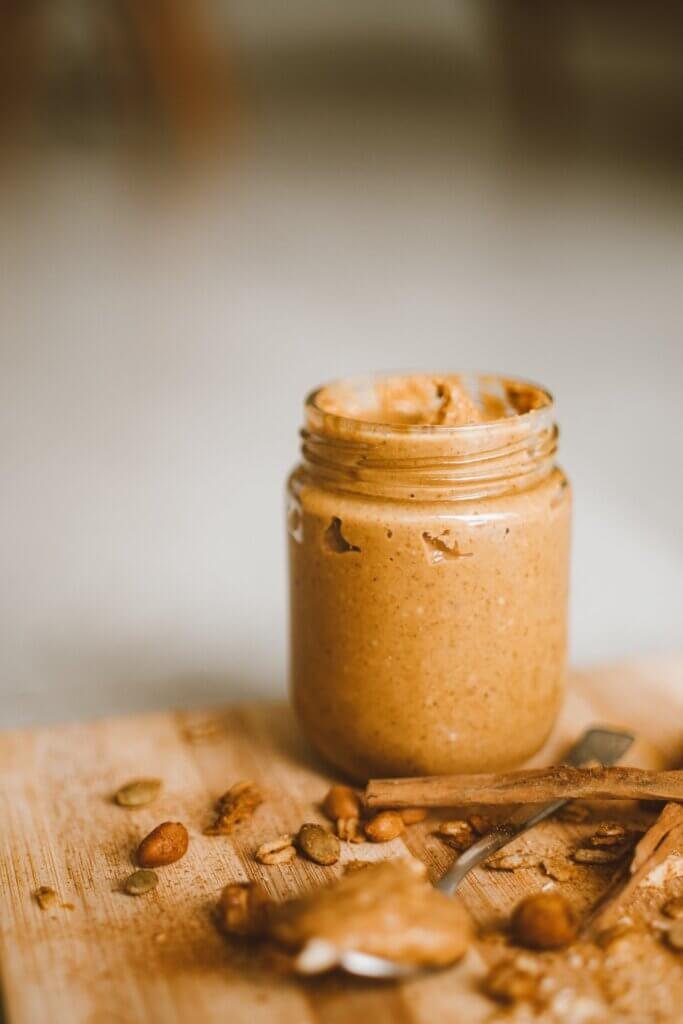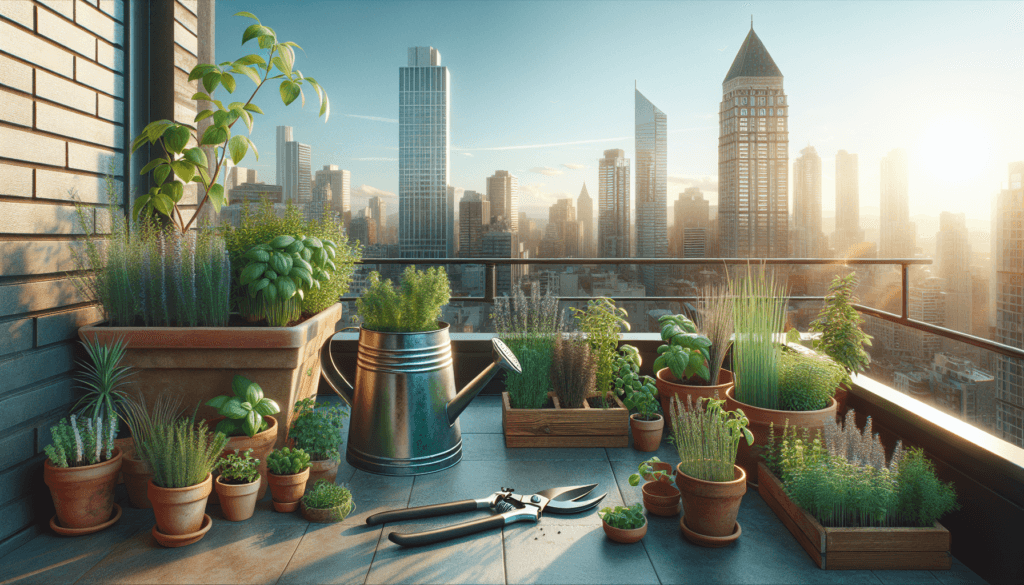Are you craving the taste of fresh herbs but don’t have a backyard? Fear not! In this article, discover a treasure trove of tips and tricks for creating your very own balcony herb garden in the heart of the city. You’ll learn how to maximize your space, choose the perfect herbs for your culinary adventures, and maintain a thriving garden even in the midst of urban chaos. Get ready to transform your balcony into a fragrant oasis and elevate your cooking game to new heights.

Choosing the Right Herbs
When it comes to growing herbs on your balcony, one of the first things you need to consider is the space available. Take a look at the size and layout of your balcony and determine how much space you can allocate for your herb garden. Whether you have a small balcony or a larger one, there are options for everyone.
Once you’ve assessed the available space, it’s time to decide on the types of herbs you want to grow. Think about the herbs you use most in your cooking or the ones that catch your interest. Popular options for balcony herb gardens include basil, thyme, rosemary, mint, and parsley. Consider the flavors you enjoy and the ones that are suited to the growing conditions of your balcony.
Speaking of growing conditions, it’s essential to consider the specific conditions of your balcony. Does it receive full sun all day or is it partially shaded? Are there any strong winds or other environmental factors that could impact the growth of your herbs? Take note of these factors and choose herbs that are well-suited to the growing conditions on your balcony.
Selecting the Right Containers
Choosing the right containers for your balcony herb garden is another crucial step in ensuring their success. Look for containers that have good drainage to prevent water from pooling at the bottom. This is especially important if your herbs are in a location that receives a lot of rainfall or if you tend to water them generously.
Consider the size of the containers as well. The containers should be large enough to accommodate the root systems of your herbs and provide enough space for growth. Keep in mind that some herbs, like mint, tend to spread and need more room to grow compared to others.
When it comes to materials, opt for containers that provide insulation. This will help protect the roots of your herbs from extreme temperature changes. Materials like terracotta or clay pots are excellent choices as they provide natural insulation and allow the soil to breathe.

Preparing the Soil
To ensure the health and growth of your herbs, it’s important to prepare the soil properly. Start by using high-quality potting soil that is well-draining. Avoid using garden soil or topsoil, as they may be too heavy and compact for containers.
Consider adding compost or organic matter to enrich the soil. This will provide essential nutrients and improve the overall structure of the soil. Incorporating compost also helps retain moisture, which is beneficial for the herbs.
Proper drainage is crucial for the herbs’ root health. Ensure that your containers have drainage holes to prevent water from sitting in the soil for too long. If necessary, add small rocks or pebbles at the bottom of the containers before adding the soil to facilitate drainage.
Providing Adequate Sunlight
Sunlight is a vital component of herb growth, so it’s crucial to determine the amount of sunlight your balcony receives. Observe your balcony throughout the day and take note of the sunny spots and any areas that are shaded. Most herbs require at least 6 hours of direct sunlight per day, so choose the sunniest spot on your balcony for optimal growth.
If your balcony doesn’t receive direct sunlight for long periods, consider using reflective surfaces to maximize the available sunlight. Mirrors or shiny materials can help bounce sunlight back onto your herbs, effectively providing them with more light.

Watering and Fertilizing
Proper watering and fertilization are essential for the health and productivity of your herbs. Water your herbs regularly, keeping the soil moist but not waterlogged. The frequency of watering will depend on factors like the size of the containers, the weather conditions, and the specific needs of your herbs.
Avoid overwatering your herbs, as excessive moisture can lead to root rot and other problems. On the other hand, be mindful not to allow the soil to dry out completely, as this can stress the herbs and hinder their growth.
Consider using a water-soluble fertilizer specifically formulated for herbs. This will provide the necessary nutrients to support healthy growth and abundant flavor. Follow the instructions on the packaging for proper dilution and application.
Pest Control
Pests can be a nuisance in any garden, but there are several ways to control them in your balcony herb garden. Regularly inspect your herbs for any signs of infestation, including chewed leaves, holes, or discoloration. Early detection is key in preventing pests from spreading and causing significant damage.
Rather than relying on chemical pesticides, consider using natural pest control methods. For example, you can make a homemade insecticidal soap by mixing liquid dish soap with water. Spray this solution on your herbs to deter pests like aphids, mites, and whiteflies.
Another effective pest control method is companion planting. Some herbs, like marigolds and basil, have natural properties that repel pests. Planting these herbs alongside your main herb crops can help deter pests and create a more balanced ecosystem.

Pruning and Harvesting
Pruning your herbs regularly is essential for promoting healthy growth and maintaining their shape. Remove any dead or yellowing leaves, as well as any stems that appear weak or damaged. This will encourage the herbs to produce new growth and remain compact and bushy.
Harvesting your herbs regularly not only provides you with fresh ingredients for your culinary creations but also encourages continuous growth. When harvesting, always cut from the top, just above a leaf node. This will stimulate new growth and ensure that your herbs remain productive throughout the season.
Consider drying or preserving some of your herbs for future use. This can be done by hanging them upside down in a well-ventilated area or using a dehydrator. Dried herbs can be stored in airtight containers and used in cooking or herbal preparations when needed.
Dealing with Space Limitations
If you have limited space on your balcony, there are several techniques you can use to optimize your herb garden. Vertical gardening is a great option, as it allows you to grow herbs vertically, taking advantage of the vertical space. You can use hanging planters, vertical planters, or even repurpose items like shoe organizers to create a vertical herb garden.
Hanging baskets or wall-mounted planters are also excellent space-saving options. These can be hung from railings, walls, or ceiling hooks, allowing you to utilize the vertical space while keeping the floor area free.
Grouping herbs with similar growing requirements is another practical approach. By grouping herbs that have similar sun, water, and soil requirements, you can make the most of your available space while ensuring that each herb receives the conditions it needs to thrive.

Protecting Herbs from City Pollution
Growing herbs in the city can expose them to various pollutants, so it’s important to take steps to protect them. Before consuming your herbs, thoroughly wash them to remove any pollutants that may be present. This is especially important if your balcony is located near busy roads or industrial areas.
Consider using organic or non-toxic pest control methods to avoid introducing harmful chemicals into your herb garden. Organic pest control options include neem oil, diatomaceous earth, and beneficial insects like ladybugs or lacewings.
To create a barrier between your plants and pollution sources, you can use physical barriers like trellises or screens. These can help block pollutants and minimize their impact on your herbs. Additionally, adding air-purifying plants to your balcony can help improve air quality and create a healthier environment for your herbs.
Enjoying the Benefits
Once you have successfully set up and tended to your balcony herb garden, it’s time to reap the rewards of your efforts. Experience the joy of cooking with fresh herbs that you have grown yourself. There’s nothing quite like the flavor and aroma of herbs picked just moments before adding them to your favorite dishes.
Creating a relaxing and aesthetically pleasing balcony space is another benefit of balcony herb gardening. The sight of lush green herbs and the calming scent they emit can create a peaceful atmosphere, perfect for unwinding after a long day.
Finally, take pride in growing your own herbs. Not only are you saving money by growing your own herbs instead of buying them at the store, but you’re also reducing your carbon footprint by eliminating the need for transportation. Plus, there’s a certain sense of accomplishment that comes with nurturing and watching your herbs thrive. So sit back, relax, and enjoy the fruits of your labor.


